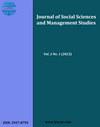Pela Gandong local wisdom as multicultural education model after the Ambon Conflict
引用次数: 2
Abstract
The purpose of this study is to describe how Pela Gandong as a model of multicultural education has been implemented between the State Junior High School (SMPN) 9 Ambon City and the State Junior High School (SMPN) 4 Salahutu Liang, Central Maluku Regency. The Ambon conflict became a very valuable lesson for the Indonesian people, especially the Ambonese-Maluku people. That the diversity that has been bestowed must be managed properly and is a reality of life. The Ambon conflict is the largest civil conflict based on ethnicity, religion, race and ethnicity (SARA) after the fall of the Suharto government on May 21, 1998. After the Ambon conflict ended, various parties began to think about how to do peacebuilding so that similar conflicts did not happen again. One of them is implementing multicultural education based on the local wisdom values of Pela Gandong. During the Ambon conflict resolution, Pela Gandong's local wisdom became the medium. The research method used is descriptive qualitative with a case study approach. Data was collected by means of literature study, interviews, observation, and document analysis. The results show that Pela Gandong contains multicultural values that have been built by the ancestors of the Maluku people, and is currently uniting Muslim and Christian students with a local cultural approach. The implementation is done by transforming Pela Gandong values in schools and teacher exchanges. Then jointly held; scouting activities, camping, Christmas, iftar, Sports and Arts Week. Both schools were also part of the 2013 film Provocateur of Peace as a campaign for peace and the spread of multicultural values.培拉甘东地方智慧作为安汶冲突后多元文化教育的典范
本研究的目的是描述佩拉甘东作为多元文化教育的典范如何在安汶市国立初中(SMPN)和马鲁古中央区萨拉胡图梁国立初中(SMPN) 4之间实施。安汶人的冲突成为印尼人民,特别是安汶人-马鲁古人非常宝贵的一课。必须妥善管理所赋予的多样性,这是生活的现实。安汶冲突是1998年5月21日苏哈托政府倒台后最大规模的民族、宗教、种族和民族(SARA)冲突。安汶冲突结束后,各方开始思考如何做好和平建设,避免类似冲突再次发生。其中之一就是以培拉甘东的地方智慧价值观为基础,实施多元文化教育。在安汶冲突的解决过程中,佩拉甘东的地方智慧成为媒介。使用的研究方法是描述性定性与案例研究法。采用文献研究法、访谈法、观察法和文献分析法收集资料。结果表明,Pela Gandong包含了由马鲁古人的祖先建立的多元文化价值观,目前正在以当地文化的方式团结穆斯林和基督教学生。实施方式是通过转变培拉甘东学校的价值观和教师交流来完成的。然后共同持有;童军活动,露营,圣诞节,开斋,体育和艺术周。这两所学校也是2013年电影《和平挑衅者》(Provocateur of Peace)的一部分,旨在推动和平与多元文化价值观的传播。
本文章由计算机程序翻译,如有差异,请以英文原文为准。
求助全文
约1分钟内获得全文
求助全文
来源期刊

Journal of Social Sciences and Management Studies
Social Sciences and Management Studies-
自引率
0.00%
发文量
0
期刊介绍:
Journal of Social Sciences and Management Studies (ISSN: 2957-8795) is a peer reviewed journal focuses on integrating theory, research and practice in the area of management and social sciences. The journal discusses the distinctive disciplinary practices within the sciences of the management and social field and examines examples of these practices. In order to define and exemplify disciplinarity, the journal fosters dialogue ranging from the broad and speculative to the microcosmic and empirical. In considering the varied interdisciplinary, trans-disciplinary or multidisciplinary work across and between the social, natural and applied sciences, the journal showcases interdisciplinary practices in action. The focus of papers ranges from the finely grained and empirical, to wide-ranging multi-disciplinary and transdisciplinary practices, to perspectives on knowledge and method.
 求助内容:
求助内容: 应助结果提醒方式:
应助结果提醒方式:


